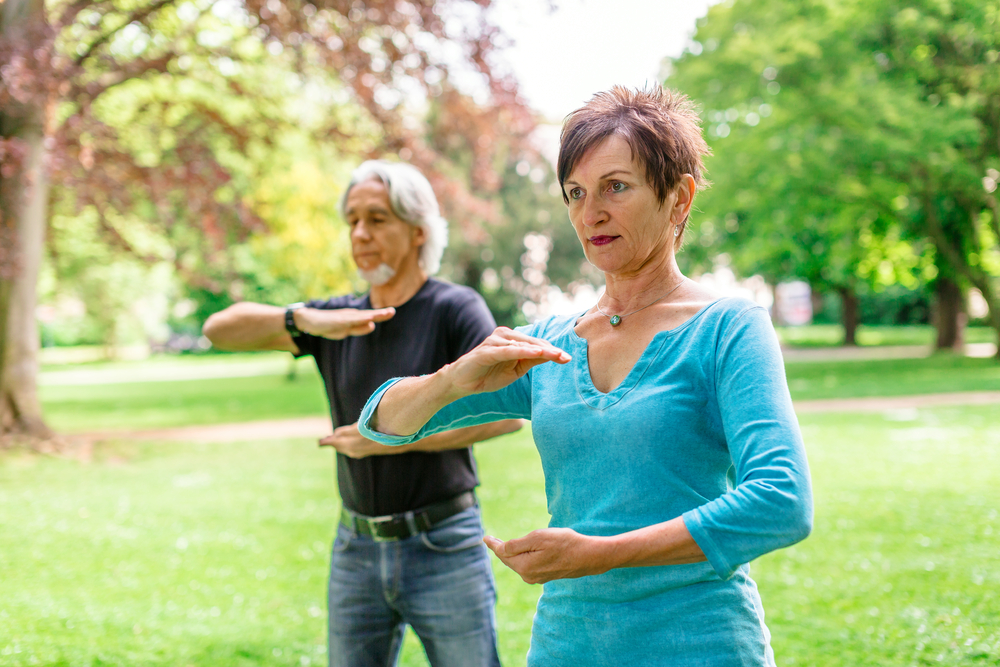Exercise May Slow Cognitive Decline in Patients With APOE4

Exercise can slow early cognitive decline in Parkinson’s disease patients who have a variant of the APOE gene, called APOE4, a recent study has found.
“Additional research is needed to confirm our findings, but these results would support the use of interventions that target physical activity as a way to delay cognitive decline in people with early Parkinson’s who have the [APOE4] gene variant,” Jin-Sun Jun, MD, said in a press release. Jun is the study’s lead investigator and a professor at Hallym University in South Korea.
The study “Association of Physical Activity and APOE Genotype With Longitudinal Cognitive Change in Early PD,” was published in the journal Neurology.
The APOE gene, which provides instructions for making the APOE protein, has several distinct variants. The APOE4 variant has been linked directly to Lewy body dementias like Parkisons’s through its regulation of alpha-synuclein, the protein that forms toxic clumps known as Lewy bodies, which damage nerve cells and are a hallmark of Parkinson’s disease.
While APOE4 is a known risk factor for Alzheimer’s disease, a 2020 study found that mice that carry APOE4 accumulate more alpha-synuclein in their brains, and patients who carried this variant had a faster, earlier cognitive decline than those without.
Because exercise is associated with better outcomes and is known to improve quality of life in Parkinson’s patients, researchers at Hallym University sought to determine if exercise affects cognitive decline in individuals with early Parkinson’s disease who carry the APOE4 variant.
The study used data from the Parkinson’s Progression Markers Initiative (PPMI), an ongoing observational study to identify biomarkers of Parkinson’s disease progression. Beginning in year 2 of the PPMI study, and then annually at years 3 and 4, patients were asked to self-report physical activity using the Physical Activity Scale of the Elderly. These included activities such as walking or biking, as well as household activities like yard work.
Genetic data was recorded for study participants along with their cognitive function using the Montreal Cognitive Assessment (MoCA), a scale of 0 to 30 where a score of at least 26 is considered normal. The researchers used this data to analyze the potential association between physical activity, cognitive function, and APOE4.
Dopamine transporter (DAT) imaging was performed at years 2 and 4, to measure dopamine function — a brain chemical gradually lost during the course of Parkinson’s disease.
A total of 173 early Parkinson’s patients were included in the analysis (mean age 63.3, mean age at disease onset 59) of whom 27% carried the APOE4 variant.
The mean MOCA score at baseline was 26. Over the course of the PPMI study, cognitive scores declined by an average of 1.337 points in patients with the APOE4 variant when compared to those without it.
Physical activity was found to slow cognitive decline significantly in patients with APOE4 by an average of 0.007 points. This protective effect did not seem to be mediated by dopaminergic function, since physical activity did not seem to interfere with changes in DAT activities in patients carrying this genetic variant.
The researchers noted that the study had some limitations, namely the use of a patient-reported physical activity assessment that required patients to remember their physical activity levels. Still, the results indicate that exercise may have potential therapeutic benefits for certain Parkinson’s patients.
“Problems with thinking skills and memory can have a negative impact on people’s quality of life and ability to function, so it’s exciting that increasing physical activity could have the potential to delay or prevent cognitive decline,” Jun said.






